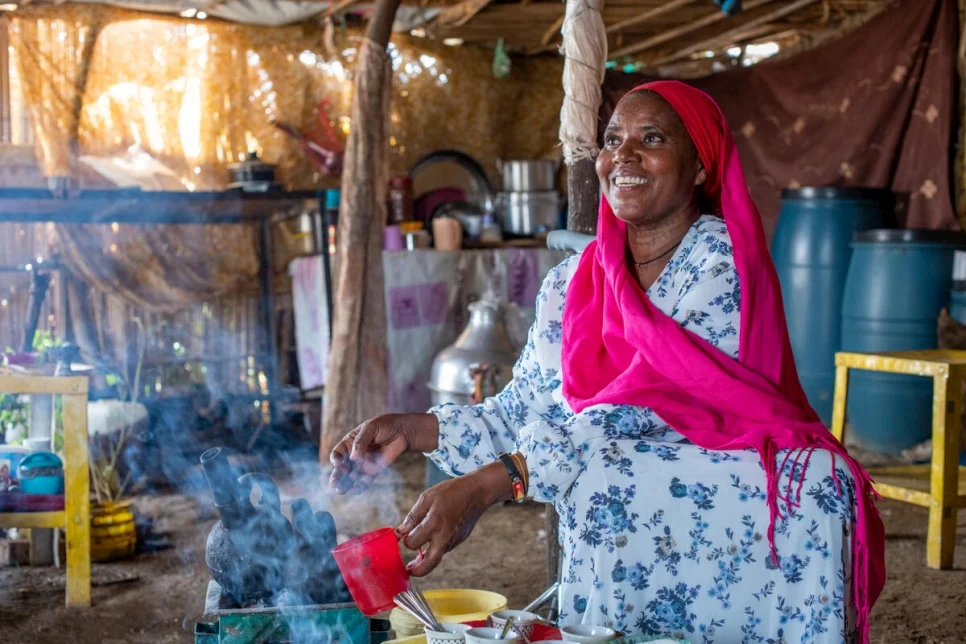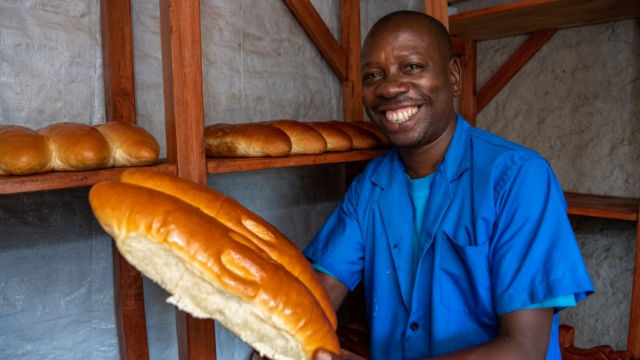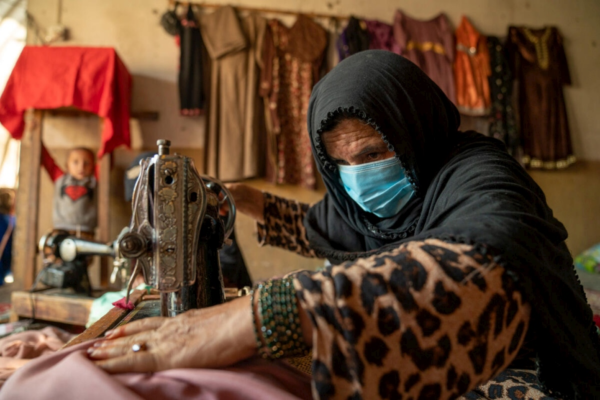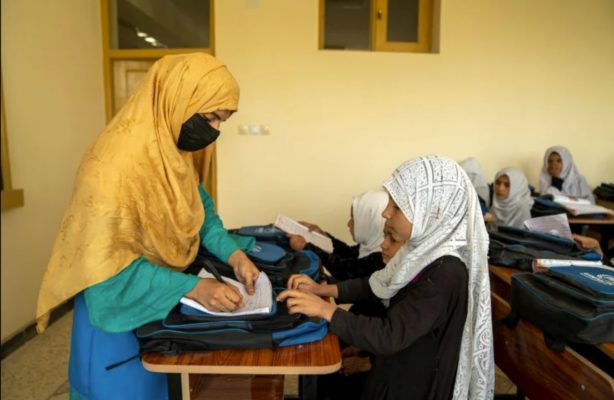Freweyni Tadese is keeping Ethiopia’s coffee traditions alive and earning a living through her coffee shop in Sudan’s Tunaydbah refugee camp.
By Afarin Dadkhah and Samuel Otieno in Tunaydbah, Sudan | 03 February 2023
The smoky aroma of coffee permeates the air as Freweyni Tadese, 48, roasts beans over a charcoal stove. With a wooden pestle and mortar, she then grinds the darkened beans into a fine ground which she carefully pours into a Jebena, a traditional clay coffee-pot she carried with her when she fled Ethiopia’s Tigray region.
“Back at home, coffee is highly regarded and we grow it ourselves. We all have it in our homes,” says Freweyni, adding that every cup reminds her of home.
Soon, the coffee pot sizzles and Freweyni pours the dark liquid from a height into traditional handleless mugs without stopping until all the cups are filled. Her traditional methods of coffee-making have been passed down through generations.
“This first round is called awel,” she says, adding that awel is the strongest of the three rounds she’ll brew from her freshly ground coffee. She serves each cup with a small dish of popcorn.
As she works, she describes her life back home in Tigray where she sold homemade fruit popsicles from her own shop. The business allowed her to provide a comfortable life for her family while bringing joy and sweetness to her community.
“We were at peace, everyone was happy,” says Freweyni. “With the income from the popsicle shop, I could send my kids to school, even to university.”
But everything changed overnight when conflict broke out in the Tigray region in November 2020, eventually forcing approximately 60,000 men, women and children to cross the border into Sudan and displacing millions of others within Ethiopia.
“We had no money, no clothes and were starving.”
As the fighting came close to her home in December 2020, Freweyni and her four children left everything behind and fled on foot towards Sudan. They walked for two straight days before crossing the border to safety.
“We had no money, no clothes and were starving,” she says.
It was not the first time that Freweyni had been forced to flee. She was a young child when she first came to Sudan as a refugee with her family in the mid-1980s, fleeing the civil war and devastating famine in Ethiopia.
Later, she lived and worked in Eritrea for 16 years before she was forced to flee again when war broke out between Ethiopia and Eritrea in the late 1990s. She eventually found her way home, this time to Humera, Tigray, where she re-established her life and set up her business, not knowing that she would have to leave it all behind once more.
Now safely settled with her family in the Tunaydbah refugee camp in Gedaref State, eastern Sudan, Freweyni has managed to set up a small coffee shop driven by her love of coffee and memories of home.

Freweyni uses a charcoal stove to roast coffee beans. She is helping other women in the camp to start their own businesses. © UNHCR/Samuel Otieno
Freweyni also recognizes the need to connect her customers, most of them Ethiopian refugees, with home.
“This is our culture,” she says. ‘If we don’t drink coffee three times [a day], we cannot work, but if we take coffee, we can do everything.”
Freweyni credits her success to both her determination to change her life and community for the better and support from humanitarian agencies, including UNHCR. She uses part of her profits to support other women in her community, particularly older women.
“When I started this business, I started it with little, and now, as you see, I have many customers. I am in a better place,” she says.
UNHCR, the UN Refugee Agency, is working with its partners to scale up support for refugees in eastern Sudan, particularly women, to establish small businesses and access employment opportunities in the camp as well as in surrounding host communities.
“When we support refugee women to create livelihoods and become more self-reliant, they are able to send their children to school and meet the needs of their families, which helps minimize the protection risks that they often face in displacement,” says Waleed Alzubir Mohamed, a community-based protection associate with UNHCR.
Freweyni has become an inspiration to other refugees, especially women, to start their own small businesses.
“When they see my success, many women come and ask for my advice; they ask me many questions: how do you start? What can we do to start this business?”
She shows them the ropes, giving them advice on what they need to buy first and where to set up their businesses to attract customers. With Freweyni’s support, one of her closest friends has now opened a small restaurant in the camp.
“I encourage many women to work hard to create something,” she says. “It helps cope with the stress and hardship of living in displacement.”
Originally published by UNHCR on 03 February 2023.





